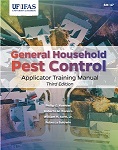
A Periodic ESA Service for ACEs and Urban-Industrial BCEs
November, 2013
The Entomological Society of America is the #1 source of scientific information for the urban entomologist. This email is a service of the Entomological Society of America for all Associate Certified Entomologists (ACEs) and Board Certified Entomologists (BCEs) who hold a specialty in urban and industrial entomology.
Before we get into the science, though, I want to remind everyone that this is "renewal season" for ACEs and BCEs. Forms were mailed to everyone recently and a second set of forms will mail in early December for those whose renewal has not yet been processed. We are phasing in a change for all renewing ACEs -- in 2014 this is optional and starting in 2015 the change is mandatory. All changes are detailed on the ACE renewal form but are essentially two things (a) CEUs are required, and (b) the renewal period is moving to a 3-year term. Don't forget to submit your PCO license and sign the code of ethics too. If you are a BCE, please either renew your BCE with your ESA membership or use the BCE renewal form.
And now, on with the science ...
Here is a summary of some recent articles in the ESA journals that relate to structural pest management and urban arthropod pests. The abstracts are freely available online for all articles, though access to the full text will generally require member in the Entomological Society of America, in addition to your certification.
Pesticide-Induced Release From Competition Among Competing Aedes aegypti and Aedes albopictus (Diptera: Culicidae)
Abstract: Competitive interactions between mosquitoes Aedes aegypti (L.) and Aedes albopictus (Skuse) may depend on environmental conditions. Pesticides may alleviate density-dependent competition for limited food, and a differential species response to sublethal concentrations may modify interspecific competition. We tested the hypothesis that exposure to malathion alters interspecific resource competition between these two species. In the absence of malathion, Ae. aegypti survivorship and per capita rate of population change were negatively affected by increasing densities of Ae. albopictus. (Full abstract here)
Authors: Alto, Barry W.; Lampman, Richard L.; Kesavaraju, Banugopan; Muturi, Ephantus J.
Source: Journal of Medical Entomology, Volume 50, Number 6
DNA Barcoding Distinguishes Pest Species of the Black Fly Genus Cnephia (Diptera: Simuliidae)
Abstract: Accurate species identification is essential for cost-effective pest control strategies. We tested the utility of COI barcodes for identifying members of the black fly genus Cnephia Enderlein (Diptera: Simuliidae). Our efforts focus on four Nearctic Cnephia species—Cnephia dacotensis (Dyar & Shannon), Cnephia eremities Shewell, Cnephia ornithophilia (Davies, Peterson & Wood), and Cnephia pecuarum (Riley)—the latter two being current or potential targets of biological control programs. We also analyzed one Palearctic species, Cnephia pallipes (Fries). Although Cnephia adults can be identified anatomically to species, control programs target the larval stage, which is difficult or impossible to distinguish morphologically. (Full abstract here)
Authors: Conflitti, I. M.; Pruess, K. P.; Cywinska, A.; Powers, T. O.; Currie, D. C.
Source: Journal of Medical Entomology, Volume 50, Number 6
Biting Deterrence, Repellency, and Larvicidal Activity of Ruta chalepensis (Sapindales: Rutaceae) Essential Oil and Its Major Individual Constituents Against Mosquitoes
Abstract: … This study revealed that R. chalepensis essential oil and its major compounds were active biting deterrents against Ae. Aegypti at higher application rates whereas only the essential oil showed activity similar to DEET against An. Quadrimaculatus. 2-undecanone was the most active compound in in vivo repellency bioassay against Ae. aegypti. Chemical composition of R. chalepensis essential oil varies because of plant production and harvest practices, and the activity level of the essential oil may depend on the source of the sample... (Full abstract here)
Authors: Ali, Abbas; Demirci, Betul; Kiyan, Hulya Tuba; Bernier, Ulrich R.; Tsikolia, Maia; Wedge, David E.; Khan, Ikhlas A.; BaÅŸer, Kemal Husnu Can; Tabanca, Nurhayat
Source: Journal of Medical Entomology, Volume 50, Number 6
Efficacy of ACTELLIC 300 CS, Pirimiphos Methyl, for Indoor Residual Spraying in Areas of High Vector Resistance to Pyrethroids and Carbamates in Zambia
Abstract: The selection of insecticide resistance in malaria vectors has the potential to compromise any insecticide-based malaria vector control program. To ensure that transmission-interrupting tools remain effective, and their choice is evidence based, insecticide surveillance and monitoring is essential. This study assessed and compared the residual efficacy of an organophosphate insecticide pirimiphos methyl (ACTELLIC 300 CS, 0-2-diethylamino-6-methylpyrimidin-4-yl 0, 0-dimethylphosphorothioate) at 1 g/m2 and the pyrethroid deltamethrin (K-Othrine WG 250, (S)-α-cyano-3-phenoxybenzyl (1R, 3R)-3-(2,2-dibromovinyl)-2,2-dimethylcyclopropane carboxylate) at 20 mg/m2 for indoor residual spraying on cement and mud-rendered walls inside houses. Insecticide susceptibility profiles of local malaria vectors were also assessed using World Health Organization standard protocols. (Full abstract here)
Authors: Chanda, Emmanuel; Chanda, Javan; Kandyata, Alister; Phiri, Faustina N.; Muzia, Lucy; Haque, Ubydul; Baboo, Kumar S.
Source: Journal of Medical Entomology, Volume 50, Number 6


